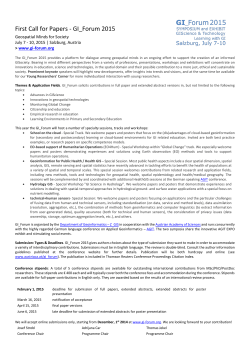
South-South Cooperation on Climate Change Forum 8 December, 2014
South-South Cooperation on Climate Change Forum 8 December, 2014 Lima Peru Background World leaders at the UN Climate Summit have “brought bold announcements and actions that would reduce emissions, strengthen climate resilience, and mobilize political will for a meaningful legal agreement in 2015.” They also saw that “Significant new announcements were made on support for South-South Cooperation on climate change, (Ban Ki-moon)”, in particular China will double its fund for South-South Cooperation. It has been widely recognized that S-S Cooperation is a new dimension of international cooperation on climate change, an increasingly important complement to the traditional North-South cooperation. China has also announced at this Summit its $6 million provisional fund to the UN in support of its efforts to promote South-South Cooperation on climate change. Prior to the Summit, China and United Nations Environment Programme (UNEP) signed an agreement on Enhancement of Collaboration on South-South Cooperation in Addressing Climate Change. Goals and Objectives The proposed SSCCC Forum aims to contribute to a successful post 2015 climate agreement by promoting South-South Cooperation as an integral part of global action combating climate change. Specific objectives are: To raise awareness of the role of South-South Cooperation To identify opportunities and challenges for South-South Cooperation To discuss and agree upon a number of enabling conditions for promoting South-South Cooperation, such as political, financial and institutional settings Expected outcome and outputs The expected outcome of this SSCCC Forum is consolidated consensus to promote South-South Cooperation on climate change to be embedded in the post 2015 climate agreement. Specific outputs are recommendations on a number innovative actions, policy setting, financing and institutional development to enable rapid scaling up of South-South Cooperation activities. Participants Participants in this forum will be mainly Ministers, principals of UN and international organizations, heads of development agencies, science and business leaders, and practitioners from around the world. Provisional Agenda The SSCCC Forum will commence with an opening ceremony and a Ministerial Dialogue, to be followed by high-level panels in plenary. Registration (8:30-9:00) Morning (9:00-13:00) 9:00—11:00, Opening Ceremony and Ministerial Dialogue 11:00—11:30, Tea/Coffee Break (Group photo) 11:30--13:00, High-level Panel 1: Enabling conditions: science, policy, fund and institution Lunch (13:00—14:00) Afternoon (14:00—18:30) 14:00—14:50, High-level Panel 2: Adaptation and livelihood 14:50—15:40, High-level Panel 3: Capacity Building for decision makers and practitioners 15:40—16:00, Tea/Coffee Break 16:00—16:50, High-level Panel 4: Technology transfer for clean energy 16:50—17:40, High-level Panel 5: Ecosystem-based Adaptation and Mitigation 17:40—18:10, Wrap up and closing Reception (18:30) Organization of the Conference The Forum is co-sponsored by the government of China (represented by the National Development and Reform Commission-NDRC), UNEP, UNDP, SDC, WWF, UNEP-IESD, UNFCCC and CAS. The Forum is organized by UNEP-International Ecosystem Management Partnership (UNEP-IEMP), NDRC Climate Change Department, and INTASAVE Outreach Outreach will be mainly through TV and internet to connect the events with the rest of the world. Interaction with media includes live broadcasts, interviews and dialogues etc. in the intervals of sessions and tea breaks. For more information, contact: ssccc-conference@unep-iemp.org
© Copyright 2025











